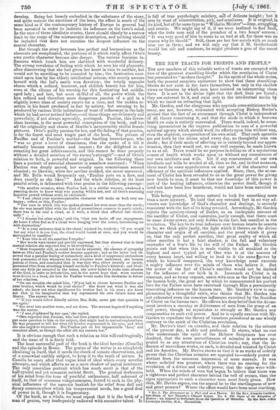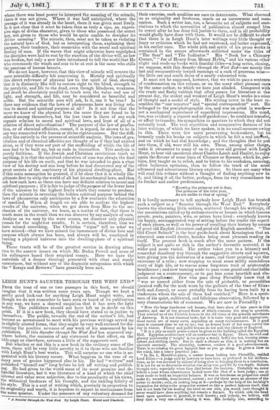is NEW TRACTS FOR PRIESTS AND PEOPLE.*
Tam new numbers of this valuable series of tracts are occupied with two of the greatest stumbling-blocks which the revelation of Christ has presented to "modern thought." In the spirit of the whole series, both the present essayists endeavour to show that these stumbling- blocks do not exist in the facts themselves, but only in the shallow views or theories by which men have insisted on interpreting those facts. It is not in the divine light that the dark lines are found ; they are external to it, and exist only in the intellectual media by which we insist on refracting that light.
Mr. Garden, and the clergyman who appends some criticisms to his essay, are not, however, contented with accepting Bishop Butler's g,iound that the fact of an atonement through Christ is independent of all theory concerning it, and that the mode in which it bestows health on man is entirely unrevealed. There would, indeed, be some- thing inconsistent in the express publication to man of a powerful spiritual agency which should 'work its effects upon him without any, even the slightest, co-operation of his own mind. That such agencies are put forth by the divine mind every day, no thoughtful man can doubt; but if their mode of affecting us is entirely beyond our appre- hension, then they would not, we may well suppose, be made known to us at all. There would be no purpose in telling us of a mysterious source of health which works upon us without any concurrence of our own intellects and wills. Yet if any concurrence of our own intellects and wills be needed at all, then so far, and in that measure, there Must be some apprehension on our part of the character and efficiency of the spiritual influences applied. Since, then, the atone- ment of Christ has been revealed to us as the great power for giving new health to man, it must be that our knowledge of this power is part of the healing influence, otherwise the power itself, though it need not have been less beneficent, would not have been unveiled to our eyes. This being granted, it seems natural to look for something more than a mere mystery. To hold that any revealed fact in no way ad- vances our knowledge of God's character and dealings, is scarcely consistent with the fact of its being revealed. Accordingly, Mr. Garden rejects the mystery-theory of Butler, as an inadequate account of the sacrifice of Christ, and maintains, justly enough, that there must be some divine power, not only hidden in the fact, but manifest in the revelation. The key to its true influence over human hearts he asserts to be, we think quite justly, the light which it throws on the divine character and origin of all sacrifice, and the proof which it gives us, that the only perfect sacrifice, that great reality of which all other sacrifice is but a faint shadow, is the full and voluntary surrender of a Son's life to the will of the Father. Mr. Garden points out that when this is made visible to all mankind as the highest and most typical act of One who is at the sources of every human heart, and willing to lend to it the same 'power by which he himself conquered, the very knowledge must exercise a mighty influence over the minds of those who believe it. But the power of the fact of Christ's sacrifice would not be limited by the influence of our faith in it. Inasmuch as Christ is in constant, and so to say organic, union with men as the Divine head of the human body, the great act by which he consummated his perfect love for the Father must have exercised through Him a permanently renovating influence on the human race. Mr. Garden's view is sup. plemented by a thoughtful critic, who thinks that Mr. Garden has not exhausted even the conscious influences exercised by the Sacrifice of Christ on the human race. He affirms his deep belief that the Atone- ment involves a rescuing or deliverance of men from the grasp of an evil power, though he repudiates as strongly as Mr. Garden any compensation to such evil power. And he is equally anxious with Mr. Garden to repudiate the theory of vicarious punishment as one wholly contrary to the spirit of the Christian revelation.
Mr. Davies's tract on miracles, and their relation to the science of the present day, is able and profound. It shows, what no one who understands the spirit of the Hebrew Scriptures has ever doubted, that the mere marvellousness of miracles is nowhere ap- pealed to as any attestation of Christian truth; nay, that the in- fluence of marvellous works, as such, is dreaded and resisted by Christ and his Apostles. ME. Davies shows us that it is as works of orderly power that the Christian miracles are appealed to—orderly power as distinct from the sensuous impression of mere marvels. It was where unbelief was greatest, where there was no craving for the revelation of a divine and orderly power, that the signs were with- held. When the minds of men had begun to believe that there was a. righteous and perfect character behind the veil of events, then the signs _appropriate to such a character were most freely given. How then, Mr. Davies argues, can the appeal be to the startli -riess of new and great powers P Where the effect would have been most startling,
• No. S. The Atonement as a Fact and as a Theory. By the Rev. Francis Garden, Sub-Dean of her Majesty'e Chapel Royal. No. 4. The Signs of the Kingdom of Heaven: an Appeal to Scripture upon the Question of Miracles. By the Rev. John Llewelyn Davies, MA. Macmillan.
where there was least power to interpret the meaning of the miracle, there it was not given. Where it was half anticipated, where the presage of it was already in the heart, there it was given most freely. Is it not clear that it must be taken then as truly a sign, an expres- sive sign of divine character, given to those who possessed the secret key, not given to those who would be quite unable to decipher its divine meaning? The miracle, then, must not be taken as violating the natural laws of God, but as interpreting them, explaining their purpose,, their tendency, their connexion with the moral and spiritual destiny of man. If the waves that might otherwise have engulphed the disciples were laid to rest by the exertion of the divine will, no law was broken, but only a new force introduced to tell the world that He who commands the winds and seas to be at rest is the same who stills the passions of human breasts.
We do not know, however, that this view of miracle will remove the mere scientific difficulty felt concerning it. Morally and spiritually this direct reference of physical law to the spirit of God, showing that it is distinctly His will to restore sight to the blind, strength to the paralytic, and life to the dead, even though blindness, weakness, and death be absolutely needful to teach men the value and use of light, and strength, and life, may be considered as beautiful and noble. But the scientific men will ask, Is it, can it be true? Is there any evidence that the laws of phenomena have any living rela- tion to moral and, spiritual purpose at all ? Is it not true that the more we know of the physical laws the more they are found to be related among themselves, but the less trace is there of any such organic relation to moral and spiritual laws, and least of all of a relation of direct subordination ? The purpose of the law of gravita- tion, or of chemical affinities, cannot, it is argued, be shown to be in any way connected with human or divine righteousness. But the diffi- culty lies entirely in the process of scientific analysis. The laws of gra- vitation and of chemical affinities are thought of as if they had existed alone, as if they were not part of the scaffolding of which the life of man had to be built up, but as ends in themselves. This analysis is purely fictitious. If the Jewish and Christian revelations teach us anything, it is that the spiritual education of man was always the final purpose of his life on earth, and that he was intended to gain a clear view of his destiny and aim long before he had discovered any of the great secrets of the machinery of his physical dwelling-place. But if this main assumption be granted, if it be clear that it is wholly ille- gitimate first to strip the world of all but its mechanical laws, and then ask how such laws as these can have any definite relation to moral and spiritual purposes ; if it is fair to judge of thepurpose of the lower laws of the universe by the highest fruits which they concur to produce, then the miracle in revealing the hidden spiritual purpose behind the laws of phenomena only anticipates by a few centuries the education of mankind. When at length we are able to analyze the highest results of the universe, when we get down from Man to the me- chanics of the universe, we learn, as a matter of fact, that there is much more in the result than we can discover by any analysis of ours. Analyze as we may by the mere senses, we discover only physical causes for the mightiest results. It is certain, therefore, that we have missed something. The. Christian "signs" tell us what we have missed—that we have missed the immanence of divine love and purpose which always has been, and always will be, employed in turning a physical universe into the dwelling-place of a spiritual being. These tracts will be of the greatest service in drawing atten- tion to the narrow issues on which Mr. Baden Powell and some of Ins colleagues based their sceptical essays. Here we have the materials of a deeper theology presented with clear and manly earnestness, but without any of the dogmatic antagonism with which the "Essays and Reviews" have generally been met.































 Previous page
Previous page